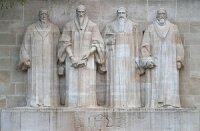 The History of Protestantism begins with the Reformation movement, which began as an attempt to reform the Catholic Church and led to the fracturing of Christendom. Many western Christians were troubled by what they saw as false doctrines and malpractices within the Church, particularly involving the teaching and sale of indulgences. Another major contention was the rampant Simony and the tremendous corruption found at the time within the Church's hierarchy. At the time, this systemic corruption often reached all the way up to the Bishop of Rome himself, the Pope.
The History of Protestantism begins with the Reformation movement, which began as an attempt to reform the Catholic Church and led to the fracturing of Christendom. Many western Christians were troubled by what they saw as false doctrines and malpractices within the Church, particularly involving the teaching and sale of indulgences. Another major contention was the rampant Simony and the tremendous corruption found at the time within the Church's hierarchy. At the time, this systemic corruption often reached all the way up to the Bishop of Rome himself, the Pope.On 31 October 1517, Martin Luther nailed his Ninety-Five Theses On the Power of Indulgences to the door of the Wittenberg Castle Church, which served as a pin board for university-related announcements. This document outlined Luther's criticisms of the Church and the Pope. The most controversial points centered on the practice of selling indulgences and the Church's policy on purgatory. Among Luther's spiritual predecessors were men such as John Wycliffe and Jan Hus. Other reformers, such as Huldrych Zwingli and John Calvin, soon followed Luther's lead. Church beliefs and practices under attack by Protestant reformers included purgatory, particular judgment, devotion to Mary, the intercession of the saints, most of the sacraments, and the authority of the Pope.
More...


No comments:
Post a Comment